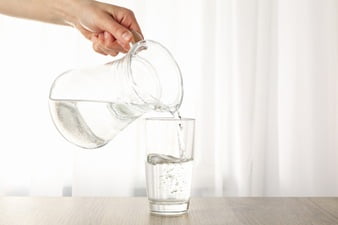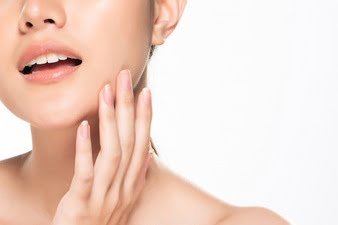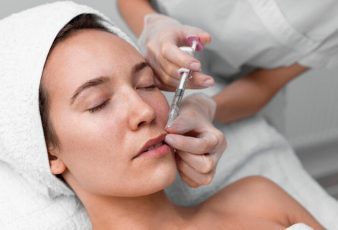The beauty industry offers a variety of products, promising the radiant glow everyone wants to have. Unfortunately, you can have all the beauty products in the world and it won’t still solve all your skin woes. Using a considerable amount of beauty products is not always a guarantee that you can get the skin you want.
If you’re tired of the 15-step skincare routine or don’t have time for intensive skincare, here are the basic and natural ways to maintain a healthy glow!
1. Sun Protection:
Perhaps one of the most critical tips to having healthy skin is to protect yourself from the sun. The hot and harmful rays of the sun can cause spots, fine lines, wrinkles, and other skin issues. Not to mention, an increased risk of skin cancer.
As much as possible, avoid sun exposure from 10 AM to 4 PM, when the sun’s rays are strongest. If you need to get out, you should wear protective clothing. Cover the skin with tightly woven long pants and long-sleeved shirts. Consider wearing a wide-brimmed hat. Umbrellas are also useful. Most of all, don’t forget to put on sunscreen!
2. Hydrate, Hydrate, Hydrate:

Although drinking water does not directly hydrate your skin, it does help in the overall functioning of your body.
Drinking enough water can assist the liver in eliminating waste substances and toxins from the body, which helps in reducing puffiness. It also improves kidney function, which, in turn, helps dark circles appear lighter. Plus, hydrating can even help skin conditions that cause dryness such as eczema and psoriasis.
How to tell if your skin is dehydrated? Read this guide to dehydrated skin or simply check your pee. If it is a deep shade of amber, then it’s time to hydrate.
3. Quit Smoking:
Smoking contributes to wrinkles and can thus age your skin more rapidly. Smoking narrows the tiny blood vessels in the skin’s outermost layers. This reduced blood flow makes your skin paler. Furthermore, it robs the skin of essential nutrients and oxygen which are crucial for skin health.
In addition, smoking also damages elastin and collagen which are the fibers that give the skin its elasticity and strength. Smoking also increases the risk of squamous cell skin cancer.
So, if you want to keep your skin healthy, you should really stop quitting. After all, smoking causes damages beyond your skin. Consider asking your doctor for treatments or tips to help you stop smoking.
4. Eat Skin-Healthy Foods:
Thus, what you eat is as important as the beauty products that you apply to your skin. A healthy diet comprised of skin-friendly foods can improve your skin health from the inside out. Plus, most beauty products use ingredients from skin-healthy plants. So, why not eat them instead?
Here are some of the research-backed foods for your skin health:
- Tomatoes: Contains lycopene that minimizes the impact of UV damage.
- Mangoes: Rich with antioxidant properties.
- Green Tea: Contains compounds like polyphenols that rejuvenate dying skin cells.
- Olive Oil: Lowers the risk of severe facial aging that includes dark spots and wrinkles.
- Omega-3: Helps prevent scaling and dryness of the skin.
- Kale: Contains zeaxanthin and lutein that protects against light-induced skin damages
5. Cut Back on Sugar:

Sometimes, your skin may take a while to catch up to what you ate last week. And if your energy source is primarily composed of refined carbs and sugar, then you will see its impact on the skin.
Too much sugar can cause an increase in insulin and inflammation. The process creates an enzyme that attaches to collagen fibers and breaks them down, causing them to lose flexibility and strength. In addition, increased insulin can cause an overdrive on your oil glands which creates a breeding ground for acne to form.
If you’re becoming more vulnerable to acne breakouts, loss of elasticity, increased wrinkles, or sun damage, then maybe you should take a look at your sugar consumption.
6. Don’t Be Too Stressed:
When we are anxious or stressed the body releases cortisol. This hormone activates your flight or fight response. While it is a good thing for survival, constant stress can keep this response on an overdrive.
In terms of skin health, an increased level of cortisol may cause the skin to lose its glow by diminishing its ability to retain moisture while promoting the overproduction of oils. Furthermore, high levels of cortisol can cause premature line and wrinkle development. Plus, stress can cause puffiness or redness due to the increased blood flow.
7. Sleep on Satin or Silk Pillowcase:
You cannot rub wrinkles into your skin. However, you can cause wrinkles while sleeping. For the side sleepers, smooshing your face into your pillow creates friction between the fabric and your skin. This creates creases that can result in wrinkles.
However, if you sleep on a satin or silk pillowcase fabric, it allows the skin to “slip” and reduce the chance of creating wrinkles. As a bonus, it’s great for preventing frizzy hair as well.
8. Sleep:

The last and ultimate natural way to maintain healthy skin? Beauty rest. Getting enough beauty sleep is a must if you want fresh, glowing skin. Sleeping is the perfect time for the body to heal and regenerate cells.
In addition, sleep reduces cortisol and increases melatonin. This sleep hormone acts as an antioxidant that helps fight wrinkles, fine lines, and skin cancer. Also, while sleeping, the body produces new collagen that helps keep the face looking plump and fresh. Lastly, through sleep, the body produces growth hormone that works in repairing cell and skin damage.
Conclusion:
From acne breakouts and oily skin during your teenage years to the puffy glow of pregnancy and the wrinkles and sunspots of aging, both your health and age are reflected in your skin.
With the helpful tips above, you should be able to care for your skin and prevent rapid aging. You don’t need additional beauty tools or skincare products to be able to follow the tips above, you just need a few changes in routine and lifestyle.




























